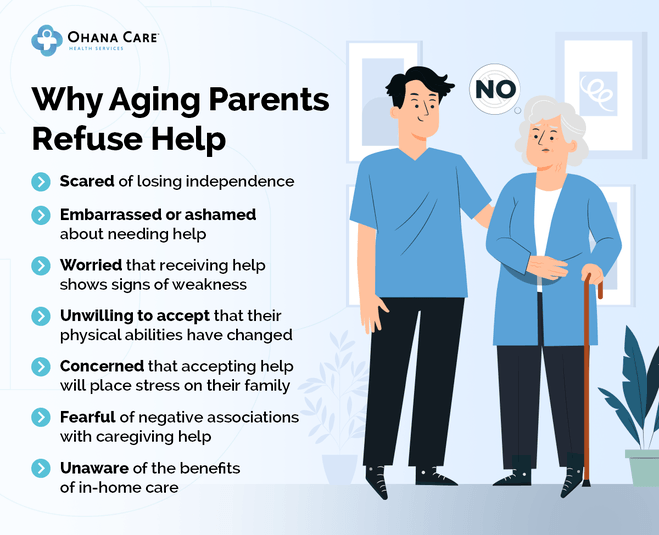Trying to help an aging parent who refuses assistance can be very challenging.
Maybe you’ve noticed them struggling with daily tasks like cooking or keeping the house tidy, or they casually mention forgetting to take their medication. You bring up the idea of getting a little extra help, but they brush it off with a firm, “I’m fine.”
It’s tough to know what to do in this situation as you’re caught between worrying about their safety and wanting to respect their independence.
In this blog post, we’ll explore why your aging parent might be rejecting help and seven tips for navigating these difficult conversations with love and understanding.
Why Aging Parents Refuse Help
Before addressing how to deal with a parent who refuses help, it’s crucial for you to understand why they’re resisting it in the first place.

7 Tips for Handling An Aging Parent Who Refuses Help
Below, we’ve listed seven tips on effectively communicating and dealing with elderly parents who refuse help.
1. Start Small
When trying to introduce the conversation of in-home care, avoid overwhelming your elderly loved one with the idea of big, immediate changes. It’s important to start with manageable, non-intrusive steps that will make their life easier and build trust in the caregiving system.
You wouldn’t run a marathon without training first, so why expect your senior loved one to embrace home care all at once?
Just like starting with shorter runs helps build endurance, starting with small, manageable changes like having an in-home caregiver assist with medication reminders or providing companionship for a few hours a week allows your parent to grow comfortable and confident with the idea of receiving help.
2. Choose the Right Moment
When discussing sensitive topics, the timing can make or break the conversation.
For example, your aging loved one will likely be more open to discussing caregiving support during a relaxed moment, like when sharing a cup of tea, rather than in the heat of the moment when you see them struggling.
Instead of seeing your loved one struggle to bring in the groceries and saying, “See, if you had a caregiver, you wouldn’t struggle like this,” wait for a more relaxing time and say, “I noticed you seemed a bit tired after carrying the groceries the other day. What if we found someone to help with things like that?”
Choosing the right time to bring up the conversation of support allows the conversation to unfold without triggering feelings of embarrassment or resistance.
3. Listen Actively

Actively listening to your senior loved one is one of the most important ways to understand their concerns about caregiving support.
When you actively listen, you can show them that you care about their feelings and create a safe space for open communication. This can make them more likely to share their fears and hesitations with you.
Like maybe they’ve heard a close friend talk about a bad experience with a caregiver, and now they’re afraid of going through the same thing. Or maybe it’s the thought of losing their independence or worrying that no one will truly understand their needs.
In order to understand the why behind their refusal of help, you need to hear them out first.
Here are a few active listening tips to try when discussing caregiving support with your loved one:
- Maintain eye contact
- Use verbal affirmations like “I understand”
- Avoid interrupting
- Reflect back on what you hear and summarize their concerns to show you’re paying attention
- Stay calm and patient
4. Appeal to Their Desire to Help You
Many seniors often worry about being a burden on family members and their adult children.
If your elderly parent refuses support, it may be worth explaining how receiving help actually benefits others around them. Letting them know that accepting assistance can ease stress for their loved ones might encourage them to have open conversations about care options.
For example, you might say, “I worry about you managing everything on your own, and having a little extra help would really give me peace of mind. It would mean so much to me knowing you’re supported.”
By appealing to their desire to help you, the conversation becomes less about them “needing help” and more about supporting the family as a whole, which can feel more empowering and less stigmatizing.
5. Frame It as Empowerment
If your parent is trying to equate support with weakness, ensure you vocalize how in-home care support is actually a great tool that can help them enhance independence and maintain control over their life.
Think of it like using a GPS while driving. Having a GPS doesn’t mean you can’t navigate on your own, but it sure helps ensure you get where you’re going more efficiently and with less stress.
When discussing in-home care with your loved one, focus on explaining how it’s a resource designed to make life easier, not take away their independence.
Here are a few ways you can frame care assistance in an empowering light and highlight the positive changes that can come from outside assistance:
- “Having someone help with meal prep means you’ll have more time and energy for the things you love, like gardening or visiting friends.”
- “A little extra support can ensure you stay in the home you love for as long as possible.”
- “Having someone around can help ensure things like medication schedules or household tasks are handled safely.”
- “Wouldn’t it be nice to have someone take care of errands so you don’t have to worry about them?”
6. Offer Choices
When you mentioned gaining support, did your loved one immediately picture being sent to an assisted living facility or having a nurse move into their home full-time?
It’s natural for someone with a negative perception of a situation to jump to extreme conclusions as a way of deflecting or resisting the idea.
By offering choices, you help your loved one maintain a sense of control and autonomy, easing their resistance and making them more open to accepting assistance.
For example, you can ask if they’d prefer a caregiver to visit in the morning to assist with breakfast or in the evening to help them wind down and get a good night’s sleep. Or, you can offer the choice of having a smaller commitment, like a weekly or bi-weekly visit, rather than jumping into full-time live-in care.
When you present different options, you empower your loved one to design the support around their comfort and needs, making it feel less like a loss of independence and more like a choice.
7. Respect Their Autonomy
At the end of the day, you can’t force older adults to receive help they don’t want.
However, you can respect their decision, acknowledge their feelings, and keep communication open.
If you have a stubborn parent who wants to make their own decisions without your opinion, consider saying something like “I understand you aren’t ready for help right now. That’s okay. I want you to know that if you ever change your mind, I’m here to support you in getting the help you deserve”.
By showing respect for their independence, you’re fostering trust and creating a safe space and support system for future conversations.
Then, over time, as their needs evolve or they experience daily challenges, they may feel more comfortable revisiting the topic without feeling embarrassed for changing their mind.
Reach Out to Ohana Care for Compassionate Care that Preserves Dignity

Balancing your parent’s safety with their independence can feel overwhelming, especially when cognitive decline and concerns about their physical condition or mental health come into play.
Whether your loved one has made the decision to accept in-home senior care or is open to the idea of future care, ensure you approach the conversation with patience, empathy, and respect for their feelings.
Keep communication open, involve them in decisions, and focus on creating a plan that supports their independence while addressing their unique needs.
When your older parent is ready for in-home care support, Ohana Care is here to help.
At Ohana Care, we recognize the importance of preserving your parent’s dignity and independence while providing the compassionate, in-home care support they need to thrive.
Whether it’s companionship, help with small tasks, like medication reminders and meal preparation, or 24-hour care, we are here for you and your loved one.
Contact us to learn more about how we can help maintain your parent’s independence while providing them with the support they deserve.





